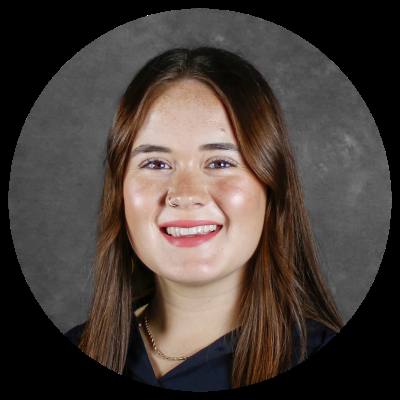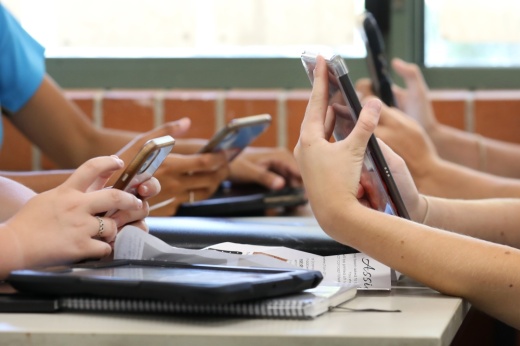Since August, LTISD has prohibited prekindergarten through eighth grade students from using cellphones or other smart devices, such as earbuds or smart watches, throughout the entire instructional day. Students who violate the protocol may have their devices confiscated or face more serious consequences upon three or more offenses.
The overview
The district’s School Health Advisory Committee recommended the policy this summer after hearing concerns from community members about students being distracted in the classroom and experiencing bullying due to cellphone use, SHAC parent co-chair Jaclyn Tully said. The district adopted the updated policy in July with the intention of improving students' focus on learning, preventing bullying and improving social interaction, according to a letter from Superintendent Paul Norton.
Previously, the district allowed students to have devices at school but confiscated those used to disrupt instructional time and charged a $15 retrieval fee, according to previous reporting by Community Impact
The change models a similar device policy adopted by Eanes ISD in 2018, and comes as many districts across the state and the nation are adopting new device restrictions. Texas Education Agency Commissioner Mike Morath recently urged state lawmakers to prohibit students from using cellphones in light of declining performance on state and national exams.
As of late September, LTISD officials said they have seen increased social interaction amongst students who are less distracted and more engaged on campus.
“Students have been so much more present and engaged with each other,” said Laura Keogh, Hudson Bend Middle School principal. “Our cafeteria is really loud now, but it's a great loud. It's happiness of kids enjoying their time together instead of being on devices.”
The approach
Districts in the area have adopted the following policies around students' use of cellphones and devices at school.
LTISD:
- Pre-K through eighth grade are not permitted to use smart devices during the school day starting upon entering campus in the morning until dismissal. Devices must be turned off and kept out of sight.
- Pre-K through eighth grade students cannot display, turn on or use a personal device during the instructional day from the morning tardy bell to dismissal.
- High school students may use devices during lunch, passing periods and off periods, but not during instructional periods unless teacher permission is granted.
- Campuses are allow to set their own policies.
LTISD's new cellphone policy has improved students’ focus during class and supported teachers who previously spent much of their time managing student cellphone use, Keogh said.
Previously, Hudson Bend Middle School allowed students to use their phones outside of class during lunch or passing periods, which made it difficult for teachers to restrict the use of cellphones. Some students would listen to music, watch videos, scroll social media platforms and text their peers during instruction, Norton said.
“[The policy] has lifted some of the heaviness that comes with managing cellphones with kids,” Keogh said. “Teachers are able to focus more on instruction, and kids are able to focus more on learning.”
One in five educators at schools with flexible device policies report spending over an hour managing student cellphone use each week, said Dana Bryson, senior vice president of social impact at Study.com, an online learning platform that supports students and teachers in over 11,000 school districts.
The organization’s 2024 survey found teachers at campuses with strict device policies—those banning cellphones during instructional time—saw higher student engagement and safety as well as reduced stress.
How it works
Students who violate the policy will receive the following consequences:
- First offense: A student’s device will be confiscated and may be picked up at the end of the school day.
- Second offense: A student’s device will be confiscated until their parent picks it up at the end of the school day.
- Third offense: A principal or assistant principal will determine the consequence such as detention or in-school suspension
SHAC recommended the policy at a June 19 board meeting in which some parents said their middle school students were being filmed by other students who were circulating videos of them on social media.
“If someone trips in the hallway and another student is able to record it on their device and then share it with the school community, that amplifies bullying in a unique way,” Tully said.
Since implementing the device policy, students have been more likely to interact with their peers and behave positively, Keogh said. Hudson Bend Middle School has seen less behavioral referrals and disagreements between students, she said.
“I’ve seen a big improvement in the social-emotional health of the students this year, which is obviously the most important thing at the end of the day,” Keogh said.
Going forward
LTISD has experienced a smooth implementation of the policy this school year with positive feedback from parents and staff members, Norton said. Although the district has confiscated a “decent number” of devices so far, the number of confiscations has significantly decreased since the first two days of school, he said.
As of late September, district staff had confiscated 45 devices at Hudson Bend Middle School and 50 devices at Lake Travis Middle School, according to data obtained by Community Impact through a public records request. Data was unavailable for other campuses as LTISD does not require schools to track the number of device confiscations, said Stephanie Clinton, LTISD public information request specialist.
Under its new policy, LTISD is no longer fining parents or students to retrieve their devices, said Marco Alvarado, executive director of communications and community relations.
The district will continue to evaluate the new device policy this school year and may consider updating its guidelines for high school students next school year, Norton said.
“I’m very appreciative of the support that we've received from our parents in the community,” Norton said. “The parents supporting the policy I think has made a huge positive difference in how well it's been implemented.”





